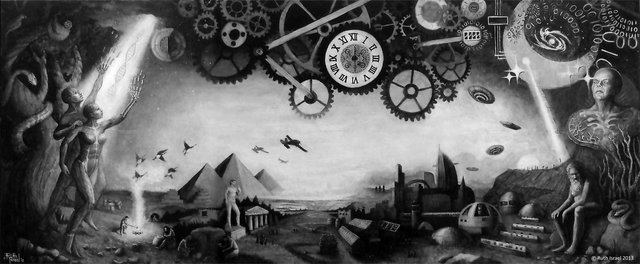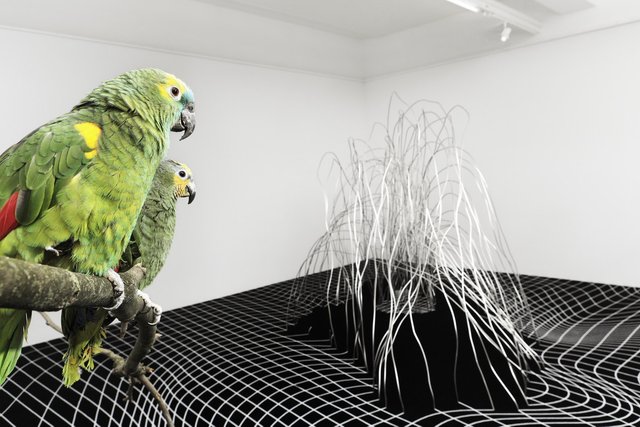Time In Aldous Huxley's Works | An Observation

BEFORE I changed it, the title of this post was Time in Aldous Huxley's Island. Simply because ever since I finshed reading that novel, a few months ago, I havent been able to shake its profound influence on me--not only as an artist, mind you--but as a human being on the whole
During the course of this writing, however, I realized that this theme of Time, even if more profound and more perfected in Island, nonetheless runs through all Huxley's work like blood in a vein.
For those who haven't read it, Island is a novel Huxley published in the year by 1962, that tells the story of a reporter, Will Farnaby, who found himself stranded on an unknown island after his boat capsized. And as fate would have it, this Island, upon which Will found himself, turned out to be the one he had gone out in search of in the first place, although you can bet his intentions were not very nice.
Enough of the summary, though. I know I have little time with your attention, and, honestly, as you'll see, time is of the essence.
ISLAND, A SEQUEL?
Now Island has been said to be a sequel to Huxley's brilliant and universally aclaimed classic Dystopian novel, Brave New World, published in 1932. Huxley himself, I believe, acknowledged this fact. But to me Island is better read as a corollary to Huxley's The Perennial Philosophy (1945).
In The Perennial Philosophy, Huxley expounded his Vedantic Philosophies, one of which is that of Time. And even though, like all mystical writings, the style of The Perennial Philosophy may be hard to understand, in Island Huxley gives a brilliant dramatization of this philosophy, thereby making it not only understandable, but immensely enjoyable at the same time.
SATIRIST OR PHILOSOPHER?
The most common reading of Island, even with its teeming Vedantic philosophies, is a satirical one. Rightfully so, of course. Huxley as a satirist is magnificent. His wit is impeccable.
Huxley has Will Farnaby repeat multiple times in the novel to satirize the journalistic unscrupulousness prevalent at the time--and till now, of course.
His wit, however, is not the Wildean make you laugh your frigging ass off sort; though of course you will laugh, but with Huxley's works you will do so recognizing at the back of your mind that there is a trenchant message behind that wit. A message that, even though not meant for you, you feel it as though it was. Not very much unlike that feeling of discomfort you get when you visit your friend who had just hurt you, and her parents choose that moment to scold her in your presence. You feel uncomfortable, of course, but you wouldn't want to miss the show for the world.
Reading Brave New World, the first Huxley I ever read, I got introduced to Huxley the Satirist. And of course I fell in love with him. But it was an immense shock to me when I met, in The Perennial Philosophy, Huxley the Vedantic Philosopher. I had to double check to make sure I was reading the same Aldous Leonard Huxley.
The most amazing thing about Island, however, is that it is only in this novel that we finally catch a glimpse of both Huxley the Satirist, and Huxley the Philosopher in the same vein.
He begins, of course, as a philosopher. And where else for the Philosopher to begin than Time itself.

ATTENTION, PLEASE
The novel opens thus:
Attention to what? One wonders at first. Even Will himself, who was lying half-dead, having just survived a boat wreck and an almost snake bite, wondered. But
[The capitalization is mine. To draw your attention to that word, change. Or rather the absence of it in the context. There was NO change. Not even the slightest.]
Now we move on to the main theme. Will is still lying hurt on the floor, although now he has come to. His mind had drifted back home, to America, where, a few years ealier, he had dumped his wife, Babs, for a more beautiful lady. Annoyed and hurt and leaving him in anger, Babs had an accident on her way, and died.
That was years ago, however, but to Will it wasnt.
Still, there on the island, lying on his back, incapacitated by both physiology and psychology, the birds were calling him to attention.
Attention to what, you ask again?
The answer comes about two pages in:
Here and now! Attention to here and now! Without beating about the bush, Huxley had introduced me to the greatest philosophy I'd ever come across. Here and Now. There was no point being anywhere else. Because you are not anywhere else. You are here! You are now! Oh and what beauty is in it! Such enormous beauty in recognizing what is here! What is now! Instead of fixing on the past or wondering about the future!
And the birds would keep iterating the message to Will Farnaby.

Later in the novel we find out the birds had been engineered to iterate this phrase by the wise men who had built a prosperous community on the island. A community whose soul, ironically, Will Farnaby had been sent by his rich boss to destroy--all because of oil.
But here was the very same island trying to heal Will. Telling him the only way for that was here and now! But Will did not/could not understand.
AN ALLEGORY?
It is not a new line of thought to consider Huxley's works as an allegory, although I don't think he himself would have attested to that.
Reading Island as an allegory, one might see Will Farnaby as a reflection of the world after the second world war. Driven to unscrupulousness by the disillusionment that arose after the war, stranded in a world that is so unfamiliar and strange, but with so many upgrades on the previous world still--Vedantic in this case, technological in ours--and man hellbent on destroying it with that innate tendency to just screw things up.
And while the above reading may be disputed due to the fact that the novel was published about 17 years after the War, it should be noted that The Perennial Philosophy which contained originally the philosophies expounded therein in Island, was published 1945.
HERE AND NOW THERE AND THERE
Like I said, the scope of time and seizing it is not limited to the works of Huxley listed above. Even in Brave New World it can be seen: in their own ways the citizens of that Dystopian world were only trying out this philosophy by taking Soma--the psychedelic drug made popular by the novel.
Time Must Have a Stop, another novel by Huxley, published in 1944, is another work which is not just the precursor to Island, but the precursor to Island's precursor, i.e The Perennial Philosophy. It was in here, in fact, that Huxley began the rigorous infusion of his mysticism into his fictional works.
Read any collection of Huxley's essay, read The Doors of Perception and again you will find this brilliant man, telling us to enjoy the moment; let go of our anxieties. The most important thing is Here; the most important thing is Now.
Failure to live here and now, Huxley is telling us, will only cause us to be swayed here and there by the proverbial wind of happenstance, a slave to vicissitudes, rustling beneath; trembling violently, uncontrollably.
Congratulations @isaacbanks!
Your post was mentioned in the Steemit Hit Parade for newcomers in the following category:
I also upvoted your post to increase its reward
If you like my work to promote newcomers and give them more visibility on Steemit, feel free to vote for my witness! You can do it here or use SteemConnect
Congratulations @isaacbanks! You have completed some achievement on Steemit and have been rewarded with new badge(s) :
Click on any badge to view your own Board of Honor on SteemitBoard.
For more information about SteemitBoard, click here
If you no longer want to receive notifications, reply to this comment with the word
STOPImpressive analysis, @isaacbanks. As someone drawn to mystical utterance, and fond of close literary readings such as what you've done here, it's heartening to discover your blog on Steemit (for which I thank:
@rasamuel)
Also, because you mention Wilde, I thought to share with you a link to a 2 part post of mine on The Importance of Lightheartedness where I mention Wilde as well as read an excerpt from Huxley's Island.
Wishing you continued success
_/|\_